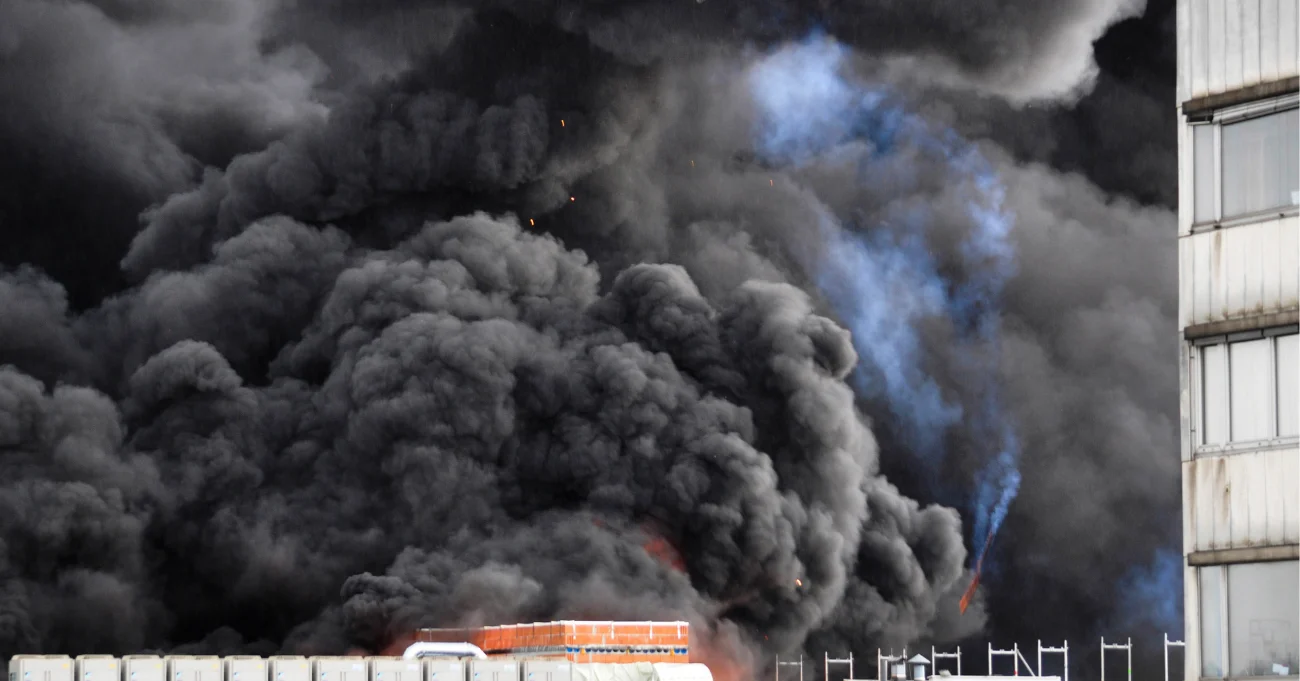The tragedy at the center of the Chemtool fire lawsuit is one of the most recent examples of the severe impact of industrial accidents on communities and the environment. Following a devastating explosion and fire in June 2021 at Chemtool’s Rockton, Illinois plant, residents within a three-mile radius have pursued a class action lawsuit against Chemtool Incorporated, alleging negligence and safety failures that resulted in property damage, evacuations, and potential health risks.
At Sparrow, we bring extensive expertise to clients facing class action disputes similar to the Chemtool fire lawsuit, such as the Unilever and Jif peanut butter class actions. Our team helps consumers understand their rights and supports them through the complexities of joining and claiming in these lawsuits.
Drawing from our experience, we’ve outlined the critical details of the Chemtool fire lawsuit, covering the allegations, Chemtool’s response, and the latest updates on settlement approval. You’ll gain insight into the case’s impact and your eligibility to claim compensation if you’ve been affected.
Let’s begin.
Overview of the Chemtool Fire Incident
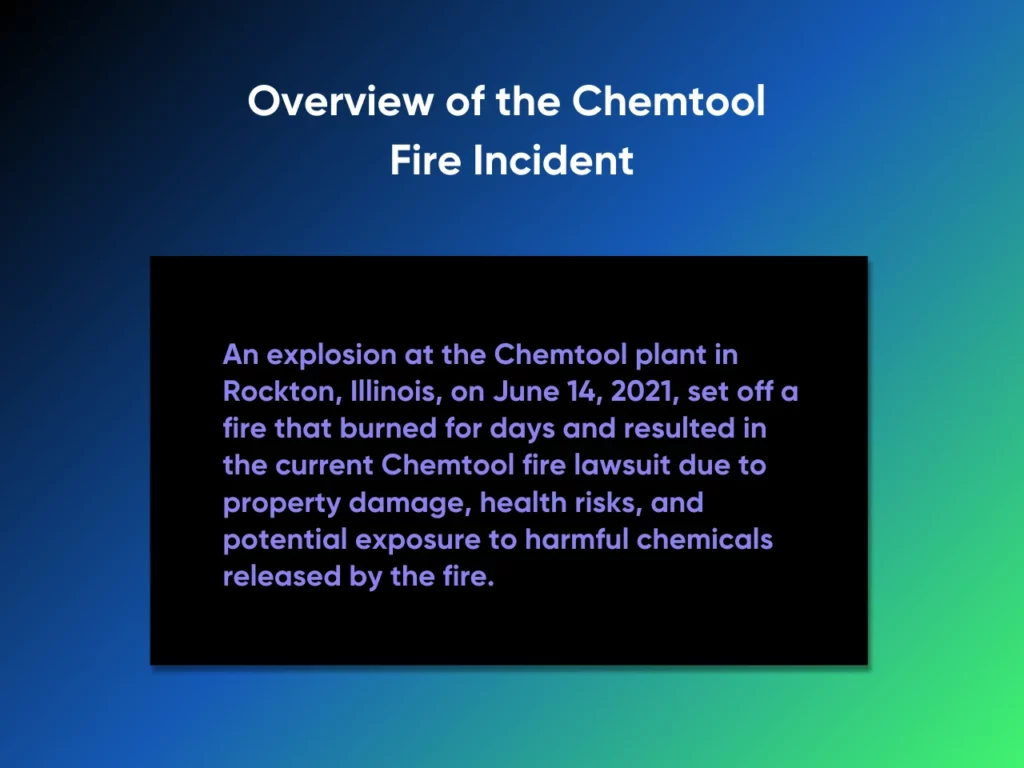
On June 14, 2021, an explosion at the Chemtool plant in Rockton, Illinois, set off a fire that burned for days. Chemtool, a major producer of lubricants and greases, was thrust into the spotlight as thick smoke and debris filled the sky. This resulted in the Chemtool fire lawsuit.
The cause of the fire at the Chemtool plant was accidental, likely caused by a scissor lift striking a valve. The impact of the explosion was immediate, with miles-long plumes of smoke prompting emergency evacuations of residents within a three-mile radius. Authorities, including local fire departments and environmental agencies, worked around the clock to contain the fire and assess the risks posed to the community.
The Chemtool explosion left Rockton and surrounding areas facing severe consequences. Residents and businesses within the three-mile evacuation radius dealt with property damage, forced closures, and potential exposure to harmful chemicals released by the fire. Local authorities, including the Environmental Protection Agency (EPA), closely monitored air and water quality, while residents raised concerns over long-term contamination and health risks.
The impact of the fire extended beyond Rockton, with health and safety concerns spreading across northern Illinois. Residents in nearby towns reported smoke-related respiratory issues, while environmental organizations conducted tests to assess soil and water contamination risks. The explosion led to the filing of the Chemtool fire lawsuit to address the significant property and economic damages, as well as environmental consequences for the affected community.
Case Details: What is the Chemtool Fire Lawsuit?
The Chemtool fire lawsuit is a class action lawsuit filed on behalf of residents, property owners, and businesses within the three-mile evacuation zone around the Chemtool plant. This lawsuit, officially named Grasley v. Chemtool, Inc., seeks to hold Chemtool and Lubrizol accountable for alleged negligence in their operations, which class plaintiffs argue directly contributed to the series of explosions and resulting damages. The class action aims to secure financial compensation for damages, including property loss, cleanup costs, and economic impacts from evacuation and disruption of business operations.
This lawsuit represents individuals and businesses affected by the fire. It covers those within a three-mile radius of the Chemtool plant who suffered property loss, environmental damage, and economic setbacks as a result of the fire. Plaintiffs argue that Chemtool’s operations posed an unaddressed risk to the local community and that safety protocols were insufficient to prevent such a disaster.
Allegations
The Chemtool fire lawsuit includes several serious allegations that form the foundation of the case against Chemtool and Lubrizol. Here are the primary allegations:
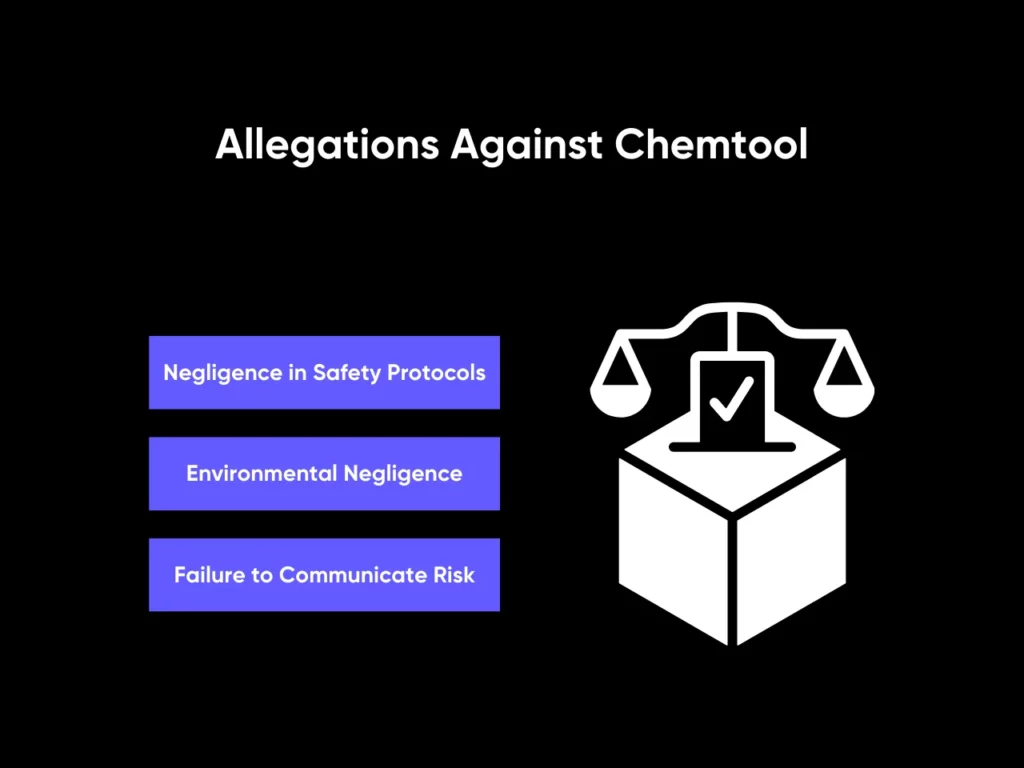
- Negligence in Safety Protocols: Plaintiffs argue that Chemtool failed to enforce adequate safety practices and necessary emergency protocols, which could have prevented or minimized the impact of the explosion.
- Environmental Negligence: The lawsuit claims that Chemtool’s operations caused severe environmental harm, including air, soil, and water contamination, with potential long-term health impacts for residents.
- Failure to Communicate Risk: The plaintiffs allege that Chemtool did not adequately communicate the potential hazards of its operations to nearby residents and businesses, leaving them unprepared and vulnerable when the explosion occurred.
Company’s Stand on the Case
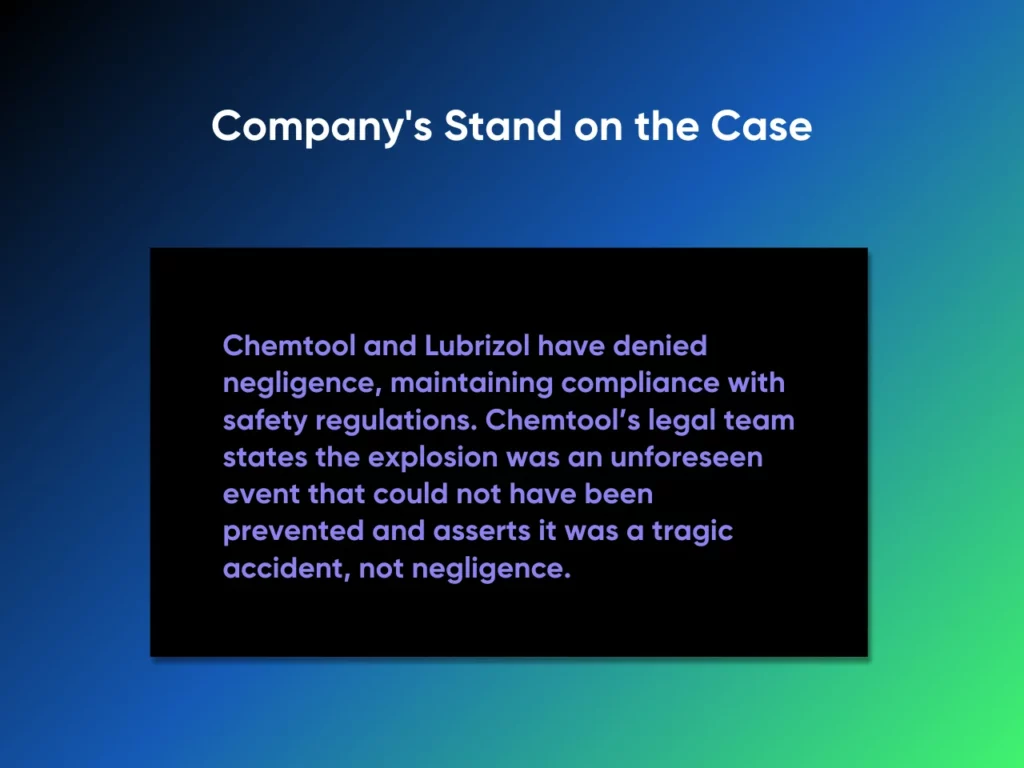
Chemtool and its parent company, Lubrizol, have denied the allegations of negligence, maintaining that they complied with all relevant safety regulations. According to Chemtool’s legal team, the explosion was an unforeseen event that could not have been anticipated or prevented despite the safety measures in place. The company asserts that the incident was a tragic accident, not a result of negligent practices.
Chemtool has also highlighted its efforts to cooperate with local authorities and environmental agencies following the incident. In its statements, the company points to its involvement in environmental assessments, monitoring of air quality, and implementing emergency response measures to reduce the incident’s impact on the community. Lubrizol has echoed these statements, expressing a commitment to ongoing cooperation with federal and state agencies to investigate and address any lingering environmental or health issues.
While Chemtool and Lubrizol continue to contest the claims of negligence, they maintain that their actions following the explosion reflect a commitment to community safety.
Settlement Details
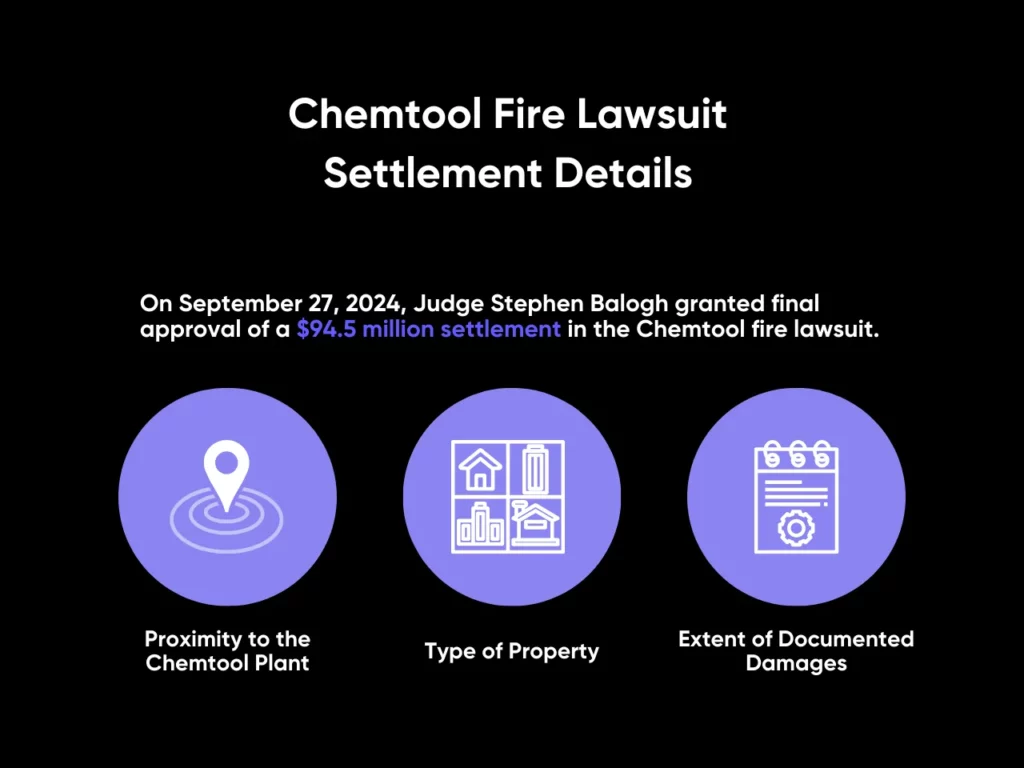
On September 27, 2024, Judge Stephen Balogh granted final approval of a $94.5 million settlement in the Chemtool fire lawsuit. This settlement marks a major step forward in addressing the damages faced by affected residents and businesses. The settlement fund is intended to provide financial relief for those who suffered property and economic losses due to the explosion, covering costs such as property damage, cleanup expenses, and business disruptions resulting from evacuation orders.
The settlement fund will be managed by a claims administrator who will oversee the compensation distribution process. Payments will be calculated based on several factors, including:
- Proximity to the Chemtool Plant: Claimants within the immediate vicinity of the plant may receive a higher portion of the settlement, as they likely endured more severe property and economic damage.
- Type of Property: Residential and business property claims will be considered separately to address different categories of losses.
- Extent of Documented Damages: Claimants with thorough documentation of cleanup costs, repair expenses, and income loss due to business interruptions will be prioritized for compensation.
This settlement does not include health-related claims, as the Chemtool fire lawsuit was filed specifically for property and economic damages. However, the fund covers a wide range of financial impacts on affected individuals and businesses, offering essential relief for the Rockton community.
Timeline of Action
The Chemtool fire lawsuit has advanced through several key stages since its initial filing. Here is a timeline highlighting significant events in this class action:
- June 14, 2021: A major explosion occurs at the Chemtool plant, prompting evacuations and an extended firefighting operation.
- June 2021: Shortly after the incident, affected residents and businesses file a class action lawsuit against Chemtool, alleging negligence and seeking damages.
- May 16, 2024: The court grants preliminary approval of a $94.5 million settlement, allowing claimants to begin filing for compensation.
- September 12, 2024: Claim filing deadline for eligible residents and businesses within the affected three-mile radius.
- September 27, 2024: Judge Balogh issues final approval for the settlement, paving the way for compensation distributions to begin.
Recent Developments in the Case
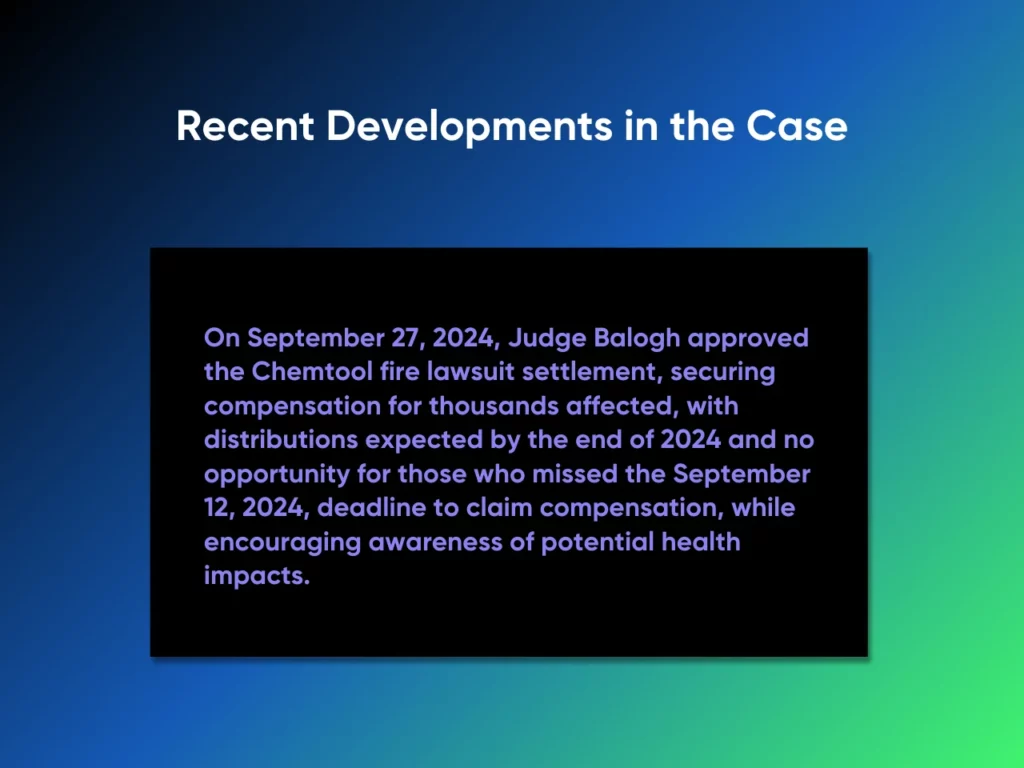
A critical update in the Chemtool fire lawsuit occurred on September 27, 2024, when Judge Balogh of the 17th Judicial Circuit Court in Winnebago County, Illinois, granted the final approval of the settlement. This approval concludes years of legal proceedings and secures compensation for thousands of residents and business owners affected by the explosion and fire. The court’s decision has enabled the claims administrator to begin processing applications, with distributions expected to start by the end of 2024.
Eligible claimants will receive compensation based on the extent of their documented property damage, distance from the Chemtool plant, and incurred cleanup or evacuation expenses. The claims administrator has also announced that claimants can check the status of their applications through an online portal, which will keep them informed of payment schedules and updates.
Residents and businesses that did not file by the deadline of September 12, 2024, will not have an additional opportunity to claim compensation under this settlement agreement. However, community class members are encouraged to stay informed, as there may be future legal developments related to potential health impacts from the explosion.
How to Stay Updated on the Chemtool Fire Lawsuit
Although the Chemtool fire lawsuit settlement was finalized on September 27, 2024, staying informed on updates is essential, especially as environmental and health concerns from the 2021 explosion could lead to further legal action. Whether you’re a resident impacted by the fire or following for professional reasons, here’s how to easily track any ongoing or future developments:
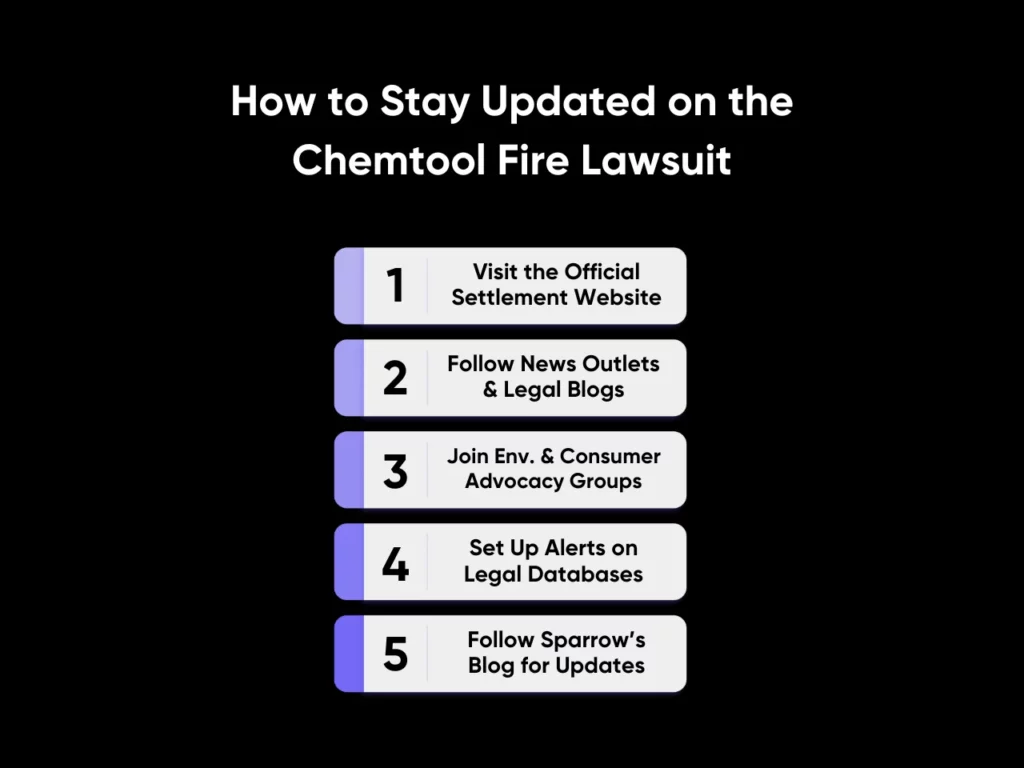
1. Visit the Official Settlement Website
The settlement website for the Chemtool fire lawsuit will post updates on payment timelines, claim processing, and any important notices from the claims administrator. Checking this site periodically is the quickest way to stay informed directly from the source on any delays, deadlines, or additional instructions for claimants.
2. Follow News Outlets and Legal Blogs
Following trusted news sources and legal websites will keep you informed on any major updates, court rulings, or environmental regulations related to this case. These outlets often report on high-profile cases like Chemtool, breaking down complex updates into simple summaries and providing insights on potential impacts for the community.
3. Sign Up with Environmental and Consumer Advocacy Groups
Many consumer and environmental organizations keep a close watch on cases like the Chemtool fire lawsuit and provide helpful updates. By subscribing to their newsletters or alerts, you can get early notifications on developments and any legal or safety changes that may follow. These organizations are also helpful for understanding broader changes in industrial regulations.
4. Set Up Alerts on Legal Databases
If you prefer direct and timely updates, setting up alerts through a legal database, like PACER or other alert services, is an easy way to get instant notifications whenever a new joint motion of the class plaintiffs or other filings occur in the Chemtool fire lawsuit. This is especially useful for staying on top of legal changes as they happen.
5. Follow Sparrow’s Blog for Simplified Updates
Sparrow’s blog provides ongoing analysis of class actions, including the Chemtool fire lawsuit. You’ll receive straightforward explanations and summaries of case developments, information on settlement opportunities, and insights into what it all means for those affected by following our updates
Taking these steps will keep you updated on any changes, future actions, or compensation opportunities that may come up in the Chemtool fire lawsuit.
Key Takeaway
The Chemtool fire lawsuit throws a spotlight on the dangers of complacency in high-risk industries. When safety protocols are lax, the consequences aren’t just corporate—they ripple out into real communities, impacting homes, health, and the environment. Chemtool’s explosion served as a stark reminder: in industries this close to people’s lives, “good enough” isn’t good enough. While the $94.5 million settlement offers some restitution for property and economic losses, it raises a new question: what about the health of those affected?
Does this settlement close the book on Chemtool? Hardly. While it brings closure to property-related damages, it leaves a key issue wide open—possible long-term health effects for residents exposed to chemical fallout. This unsettled piece could mean future litigation, keeping the legacy of this incident alive in both courtrooms and communities.
Interested in tracking cases like Chemtool? Sparrow is here to cut through the noise of complex class action settlements, offering clear guidance and updates. Follow Sparrow’s blog for insights on ongoing class action lawsuits and new avenues for compensation.
